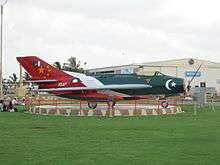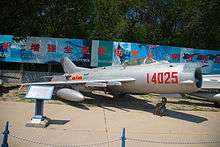Shenyang J-6
| J-6/F-6 | |
|---|---|
 | |
| A J-6 fighter flight display at the 2010 Zhuhai Air Show | |
| Role | Fighter aircraft |
| Manufacturer | Shenyang Aircraft Corporation[1] |
| First flight | 17 December 1958[1] |
| Introduction | 29 April 1962(1964,practical type) |
| Retired | Late 1990s (China) Mid-2002 (Pakistan) |
| Status | retired from 2006 to 12 June 2010 (PLAAF) |
| Primary users | People's Liberation Army Air Force Pakistan Air Force North Korea Air Force Bangladesh Air Force |
| Produced | 1958–1986 |
| Number built | 4,500+(including JJ-6 trainer)[1] |
| Developed from | Mikoyan-Gurevich MiG-19[1] |
| Variants | Nanchang Q-5[1] |
The Shenyang J-6 (Chinese: 歼-6; designated F-6 for export versions; NATO Code: Farmer) was the Chinese-built version of the Soviet MiG-19 'Farmer' fighter aircraft.[1]
Design and development

Although the MiG-19 had a comparatively short life in Soviet service, the Chinese came to value its agility, turning performance, and powerful cannon armament, and produced it for their own use between 1958 and 1981. While the basic Soviet-designed MiG-19 has been retired from all nations, the Shenyang J-6 still flies for nine of its original 15 operators, however, in a very limited capacity. The J-6 airframe contributed to the Chinese ground attack version, the Q-5, which still flies for numerous nations.
The J-6 was considered "disposable" and was intended to be operated for only 100 flight hours (or approximately 100 sorties) before being overhauled. The Pakistan Air Force was often able to extend this to 130 hours with diligent maintenance.[2]
Description
The J-6 has a maximum speed at altitude of 1,540 km/h (960 mph), Mach 1.45. Service ceiling is 17,900 m (58,700 ft). Combat radius with two drop tanks is about 640 km (400 mi). Powerplant is two Liming Wopen-6A (Tumansky R-9) turbojet engines. In addition to the internal cannon armament, most have provision for four wing pylons for up to 250 kg (550 lb) each, with a maximum ordnance load of 500 kg (1,100 lb). Typical stores include unguided bombs, 55 mm rocket pods, or PL-2/PL-5 (Chinese versions of Soviet K-13 (NATO AA-2 'Atoll') air-to-air missiles.
Operational history
Albania
Albanian Air Force J-6s replaced the J-5s on the border to intercept Yugoslav incursions into Albanian airspace. However, the J-6 was ineffective against the faster Yugoslav MiG-21 'Fishbed'. Once the F-7A became available, the J-6 was redeployed to guard Tirana. As of 2005 all Albanian fighters were grounded due to lack of spare parts.
Indo-Pakistan Wars

The F-6 was flown by the Pakistan Air Force from 1965 to 2002, the aircraft design undergoing around 140 modifications to improve its capabilities in the interceptor and close air support roles. The PAF F-6 fighters participated in the Indo-Pak War 1971 against India, scoring approximately 6 confirmed aerial victories including one Indian Mig-21. The three Pakistani J-6 squadrons flew nearly a thousand sorties,[3] during which the PAF lost 3 F-6 to ground fire and one in aerial combat. An F-6 was also lost to friendly fire.[4] One of the F-6 pilots shot down was Wajid Ali Khan, who was taken as a POW and later became a Member of Parliament in Canada. The single seat F-6 was retired from the Pakistani Air Force in 2002, but the two-seat trainer, the FT-6, remains in service in very small numbers.
Vietnam War
The supersonic speed advantage provided by the MiG-21's more modern turbojet engine was found to be not as useful in combat as originally thought, because aerial dogfights at the time were conducted almost entirely in the sub-sonic speed regime. The J-6 (and hence the MiG-19 also) was found to be more manoeuvrable than the MiG-21 and, although slower, its acceleration during dogfights was considered adequate. The North Vietnamese Air Force fielded at least one unit of J-6 during the war, the 925th Fighter Regiment, beginning in 1969.[5]
Ogaden War
Somalian J-6's participated in the 1977-1978 Ogaden War and suffered greatly because of the superior opposition faced (Cuban pilots fought for Ethiopia). Over 75% of the Somali Air Force was destroyed in the war but some J-6s and survived until the country turned into turmoil in the early 1990s.
Uganda-Tanzania War
During the 1978-1979 Uganda-Tanzania War, Tanzanian J-6's and Shenyang F-5s were tasked to handle any possible Ugandan fighters which consisted of MiG-15's and MiG-17's, while F-7A's were tasked to handle more advanced aircraft of Ugandan allies, such as the Libyan Tupolev Tu-22 'Blinder'.
Kampuchea-Vietnam War

In the era of Khmer Rouge control of Cambodia (1975-1979), Chinese-supplied Khmer J-6s participated in Kampuchea-Vietnamese border clashes for ground attacks. During the Vietnamese invasion in 1978, the Cambodian aircraft were reluctant to take-off to intercept the Vietnamese ones, thus the Vietnamese captured a number of J-6s and put them on public display.
Iran–Iraq War
During the 1980–88 Iran–Iraq War, both sides deployed J-6 fighter jets. Iran's J-6 fighters were reported sourced from North Korea. Iraq's J-6 fighters were transferred from Egyptian Air Force. Most missions J-6s performed during Iran-Iraq War were air-to-ground attack.[6]
Variants



- Shenyang J-6 – (a.k.a. Type 59, Dongfeng-102, Product 47 and F-6) Despite having no suffix to the designation, the J-6 appeared after the initial production of the J-6A had begun. The J-6 was equivalent, but not identical, to the MiG-19S.[1]
- Shenyang J-6A – (a.k.a. Type 59A, Dongfeng-103, Jianjiji-6 Jia) – Early production from 1958 to 1960 was sub-standard and not accepted by the PLAAF. Production was halted, the jigs scrapped, and production restarted with assistance from the USSR. The J-6A was equivalent to the MiG-19P but not identical. The maiden flight was made by Wang Youhuai on 17 December 1958. The total production figure for this variant was only one hundred or so. It was reported that J-6A, along with J-8B, never actually passed PLAAF's test. The planes suffered from quality issues, flight characteristics were much lower than J-6, and were of little operational value.[1]
- Shenyang J-6A – Production of the J-6 restarted after new assembly jigs, and other assistance, acquired from the USSR. Similar to MiG-19PF, an all-weather radar-equipped interceptor with two NR-30 30mm cannon. Exported as the F-6A.[1]
- J-6B – (a.k.a. Type 59B, Dongfeng-105 and Jianjiji-6 Yi) Similar to MiG-19PM "Farmer-D", interceptor with two PL-1 (Chinese version of Soviet K-5 (AA-1 'Alkali') beam-riding air-to-air missiles; it is unclear if the J-6B retains its cannon. Only 19 J-6B's were built by Nanchang Aircraft Mfg. Co. before the programme was terminated.[1]
- J-6C – (a.k.a. Jianjiji-6 Bing, Product 55 and F-6C) Day fighter version with three 30mm cannon and braking parachute at the base of the rudder.[1] This cannon's code name is Type 30-1. Firing at 850 rounds per minute, it is effective against large aircraft with its armor-piercing and high-explosive ammunitions.[7]
- Shenyang J-6I – Single-seat day-fighter prototype with fixed shock cone on the intake splitter plate.[1]
- Shenyang J-6II – Single-seat tactical fighter prototype with adjustable shock cone on a raked back intake splitter plate.[1]
- Shenyang J-6III – Advanced version of the J-6A with radome on the splitter plate (rather than the shock cone centerbody) for a Chinese-made radar. May also have been designated J-6 Xin.[1]
- Shenyang/Tianjin JJ-6 – (Jianjiji Jiaolianji – fighter trainer, a.k.a. Product 48 and FT-6) Chinese designed two-seat trainer, stretched 84 cm (33.1 in) to accommodate second seat, armed with one 30 mm cannon.[1]
- Shenyang JZ-6 – (Jianjiji Zhenchaji – reconnaissance fighter) Dedicated reconnaissance version with fuselage camera pack replacing cannon. As of April 2006, it was reported that the PLAAF 3rd Recon Regiment, 26 Air Division based in Nanjing MR, is the last regiment to actively fly the JZ-6 refusing to convert to JZ-8F.[8] Exported as the Shenyang FR-6.
- Shenyang/Tianjin JJ-6 Testbed – Ejection seat testbed that succeeded H-5 ejection seat testbed.[1]
- Guizhou J-6A – J-6A aircraft up-graded to carry two PL-2 (Pi Li – Thunderbolt) Infra-Red homing Air to Air Missiles (AAM's). The first flight was on 21 December 1975.
Operators

There are currently five active operators of the Shenyang J-6 out of fifteen total users in its history.
Current operators
- Myanmar Air Force – 1 F-6 remains in service as of December 2014.[9]
.jpeg)

- North Korea Air Force – 97 F-6s remain in service as of December 2014.[9]
- Peoples Liberation Army Naval Air Force – 14 JJ-6s remain in service as of December 2013.[9] All single-seaters (J-6) retired from frontline combat service in 1992.[10] Some J-6 were converted to target/attack drones (number not confirmed).
Former operators

.jpg)
- Albanian Air Force – 82 J-6C models, retired as of 2005.
- Egyptian Air Force – replaced by F-16
Specifications (J-6)

Data from Wilson[11]
General characteristics
- Crew: One
- Length: 12.54 m (41 ft)
- Wingspan: 9.2 m (30 ft 2 in)
- Height: 3.9 m (12 ft 10 in)
- Wing area: 25.0 m² (270 ft²)
- Empty weight: 5,447 kg (11,983 lb)
- Max. takeoff weight: 7,560 kg (16,632 lb)
- Powerplant: 2 × Liming Wopen-6A (Tumansky RD-9B) afterburning turbojets, 36.78 kN (8,267 lbf) each
- Fuel capacity: 1,800 kg (3,960 lb)
Performance
- Maximum speed: 1,540 km/h (960 mph)
- Range: 640 km (400 mi); combat 2,200 km (1,375 mi)
- Service ceiling: 17,900 m (58,700 ft)
- Rate of climb: 180 m/s (35,425 ft/min)
- Wing loading: 302.4 kg/m² (61.6 lb/ft²)
- Thrust/weight: 0.86
Armament
- 3x 30 mm NR-30 cannons (70 rounds per gun for wing guns, 55 rounds for fuselage gun)
- Up to 250 kg (550 lb) of unguided bombs or rockets pods, or PL-2/PL-5 (Chinese versions of Soviet K-13 (NATO AA-2 'Atoll') air-to-air missiles on 4 underwing pylons
See also
- Related development
- Aircraft of comparable role, configuration and era
- Related lists
References
- Notes
- 1 2 3 4 5 6 7 8 9 10 11 12 13 14 15 16 17 Gordon, Yefim & Komissarov, Dmitry. Chinese Aircraft. Hikoki Publications. Manchester. 2008. ISBN 978-1-902109-04-6
- ↑ Yeager and Janos 1986, p. 396.
- ↑ Air Commodore Qadeer Ahmad Hashmi, "Final Salute to F-6", URL: http://www.defencejournal.com/2002/may/salute.htm
- ↑ AIRCRAFT LOSSES IN PAKISTAN −1971 WAR – Bharat Rakshak
- ↑ Toperczer, Istvan. MiG-17 and MiG-19 Units of the Vietnam War. 2001, Osprey Publishing Limited. ISBN 1-84176-162-1
- ↑ "J-6 Fighter Jets in wars". AirForceWorld.com. Retrieved 5 Sep 2011.
- ↑ "J6 fighter jet ammunition". AirForceWorld.com. Retrieved 15 July 2011.
- ↑ http://china-defense.blogspot.com/2006_04_01_china-defense_archive.html
- 1 2 3 "Flight Global World Air Forces 2015" (PDF). Flight Global. December 2014. Retrieved 15. Jan 2015. Check date values in:
|access-date=(help) - ↑ "The AMR Regional Air Force Directory 2011."] Asian Military Review, February 2011. Retrieved: 21 July 2011.
- ↑ Wilson, Stewart. Combat Aircraft since 1945. Fyshwick, Australia: Aerospace Publications, 2000. p. 125. ISBN 1-875671-50-1.
- Bibliography
- Gordon, Yefim & Komissarov, Dmitry. Chinese Aircraft. Hikoki Publications. Manchester. 2008. ISBN 978-1-902109-04-6.
- Gunston, Bill. The Osprey Encyclopaedia of Russian Aircraft 1875–1995. London, Osprey. 1995. ISBN 1-85532-405-9
- Taylor, Michael J.H. . Jane's Encyclopedia of Aviation. Studio Editions. London. 1989. ISBN 0-517-69186-8.
- Toperczer, Istvan. MiG-17 and MiG-19 Units of the Vietnam War. 2001, Osprey Publishing Limited. ISBN 1-84176-162-1.
- Yeager, Chuck and Leo Janos. Yeager: An Autobiography. Page 396 (paperback). New York: Bantam Books, 1986. ISBN 0-553-25674-2.
- Online
- Air Commodore Qadeer Ahmad Hashmi, "Final Salute to F-6", URL: http://www.defencejournal.com/2002/may/salute.htm
- http://www.acig.org/artman/publish/article_324.shtml
External links
| Wikimedia Commons has media related to Shenyang J-6. |
| ||||||||||||||||||||||||||||||||||||||
| ||||||||||||||||||
| ||||||||||||||||||||||||||||||||||||||||||||||||||||||||||||||||||||||||
| ||||||||||||||||||||||||||||||||||||||||||||||||||||||||||||||||||||||||||||